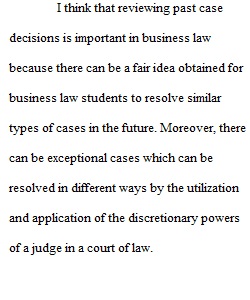


Q During this semester, we will examine past cases to learn business law. As your are reading through the chapters, note that there are a number of excerpts from relevant cases. You will also submit a case brief assignment this semester which is due on October 28. A case brief identifies the major elements of a case such as the important facts, issue, rule, reasoning and decision. Please see the general description of the case brief assignment noted in the syllabus and the case brief assignment instructions posted under the "Getting Started" module. For this discussion board, please respond to the following questions: 1. State two reasons why reviewing past case decisions is important for learning business law. 2. Please explain what might be the purpose or benefit of preparing a case brief. Please reply to two students, demonstrating that you have read their posts. Additionally, please also be sure to stay on topic and limit your discussion to only the questions posed. Please conduct yourself in the discussion board as you would in a professional, business environment. The Language should be appropriate for a professional context. I look forward to reading your posts! New threads and replies are due by 11:59 p.m this Thursday.
View Related Questions